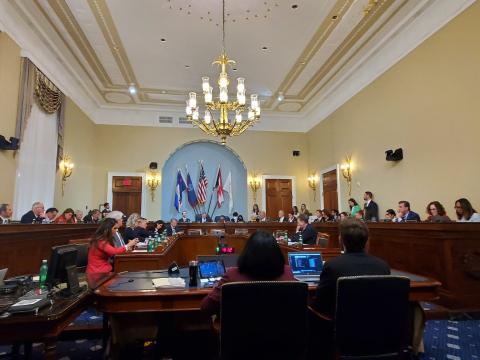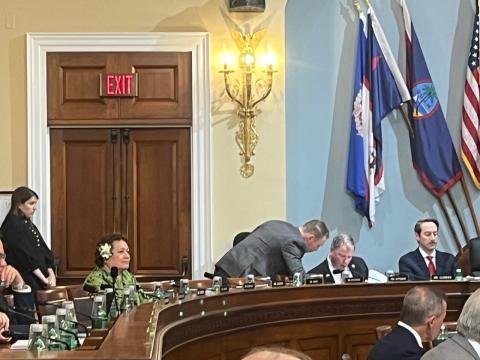Amata Welcomes Committee Passage of COFA Pacific Priority
Washington, D.C. – Congresswoman Uifa’atali Amata is welcoming House Natural Resources Committee passage of the Compact of Free Association Amendments Act of 2023, H.J. Res 96, which she cosponsored, as a key priority in U.S. commitment to the Indo-Pacific region. In his closing, Chairman Bruce Westerman (R-Ark.), said he would work with Pacific Islands Members of Congress on specific issues they had raised, “I look forward to working with Ms. Radewagen and Mr. Moylan on issues that are important to the islands they represent and their constituents…”Amata took part in the markup Wednesday on the legislation that approves the recently negotiated Compacts of Free Association (COFAs), building on America's unequivocal commitment to deterring malign Chinese influence in the region.

COFA Legislation markup in the Natural Resources Committee
Amata said, “As a representative of Pacific islands peoples of America in Congress, I proudly voted in favor of the motion to report the COFA renewal legislation for approval by the full House. I want to thank Committee Chairman Westerman for his leadership on COFA renewal.
“We also are grateful to Chairman Westerman for his understanding and willingness to consider my requests to work together with our territorial affairs Subcommittee Chair Hageman on local constitutional and legal status issues of great import to our fellow Americans in my small and remote island home American Samoa, the center of U.S. national homeland interests in the South Pacific.

Congresswoman Amata in the COFA legislation markup
“From 2019 to 2023, it was the goal of the U.S. President and Congressional leadership to ratify Compact of Free Association renewal agreements with Palau, FSM and RMI by October 1 of this year. That’s when the economic assistance and program funding that sustains political relations and strategic defense rights under the Compacts expired.
“Because current Continuing Resolution funding levels are not sustainable, approving Compact renewal agreements is a giant step to continue a seven-decade regional security partnership under the Compact that China’s government actively tried to disrupt in 2018 through 2020.
“The people of America and our allies in the region and around the world will be served well by the $7.1 billion 20 year terms for COFA renewal that will strengthen our partnership with our closest allies in the Pacific.
“For bringing this major legislative project forward at this time, in addition to the Chairman our thanks as Pacific island peoples go to Ranking Member Grijalva, Subcommittee Chair Hageman and Subcommittee Ranking Member Chair Leger Fernandez.
“As chair of the Committee’s Bipartisan Indo-Pacific Task Force, I want to thank Co-Chair Kilili Sablan for his wisdom and fairness. The mission of the Task Force was assisted as well by those members of the bicameral and bipartisan staff working group who answered the call of duty to do the legislative work we needed while leadership determined policy.
“That Senate and House working group staff was assisted by cooperation from Special Presidential Envoy Yun and his team at NSC, Defense, Interior and State, who were generous in sharing expertise when needed most to get the job done.
“Finally, I would like to make special note of the provisions of H.R. 96, the amended COFA, and its related agreements, that will enable the U.S. to continue to act under U.S. federal law, based on Congressional authorization and oversight, to meet U.S. commitments and obligations to the people of the RMI still impacted by the effects of the U.S. nuclear testing program.
“At a time when some in the U.S. government don’t seem to understand the political, social, economic and cultural consequences of continued dislocation of whole communities from their homelands for decades, H.R. 96 recognizes that the settlement of litigation in U.S. courts over specific claims based on facts known at that time does not end the mandate of COFA and the Section 177 Agreement, which does not expire without RMI consent.
“That 1985 claims settlement as confirmed and renewed by the U.S. with increased compensation in 2003, expressly authorizes “additional programs and activities as may be mutually agreed.” Now the provisions of H.R. 96 confirm that the Section 177 Agreement will continue and work in tandem with the RMI COFA Trust Fund Committee use of its resources to address on an ongoing basis mitigation of the injury to persons and damage to land caused by the U.S. nuclear testing program.
“Both Section 177 and COFA Trust Fund are international agreements in full effect and also U.S. domestic law. So, the COFA administering agencies and Congressional committees designated in the COFA Act will ensure the Section 177 Agreement mechanisms and the 2023 Amended COFA and COFA Trust Fund mechanisms work together.
“The purposes of both include providing food security, radiological monitoring and remediation, compensation determined owing by RMI, health care for communities affected by radiation exposure and continued dislocation, resettlement of homelands if and when safe, and programs for political, economic, social and cultural recovery and cohesion.
“We must mention Section 177 and COFA Trust Fund implementation at length because the U.N. Security Council authorized and had oversight of U.S. actions through the nuclear testing program from 1947 to 1958. Both the U.N. and the U.S. ultimately should and I believe will formally apologize to the RMI for the harm done to our allies.
“Because there remain issues of science, public health, law and moral responsibility that remain unresolved, the Section 177 Agreement and the 2023 COFA Trust Fund provisions related to the affected communities are in the nature of a political settlement that can be implemented only as determined to serve the best interest of the U.S. and RMI.
“So, a settlement of legal claims nearly 40 years ago, upheld by five federal appellate court rulings, is part of the COFA nuclear testing package, but lawyers and a legal settlement that cannot be re-opened unless the U.S. abandons its obligations thereunder does not impose much less control policy for U.S. and RMI mutual agreement on measures that need to be taken to keep our promises.”
Earlier this year, Chairman Westerman created the bipartisan Indo-Pacific Task Force, led by Task Force Chairman Aumua Amata Coleman Radewagen of American Samoa, and Co-Chairman Gregorio Kilili Camacho Sablan of CNMI, working directly with these topics in conducting congressional oversight on issues facing the U.S. Pacific Territories and the FAS.
In August, Congresswoman Amata took part in Chairman Westerman’s Congressional Delegation (CODEL) of nine members to the region to see firsthand and hear from local communities, to further understand the threat of the People's Republic of China under the Chinese Communist Party, in which they visited and met with leaders from the three FAS nations. The U.S. has a unique and close relationship with the Republic of Palau, the Federated States of Micronesia and the Republic of the Marshall Islands, all of vital importance to the U.S. given their history, partnership and geostrategic location in the South Pacific.
Her public remarks are available HERE, and she placed a further statement in the Record.
###